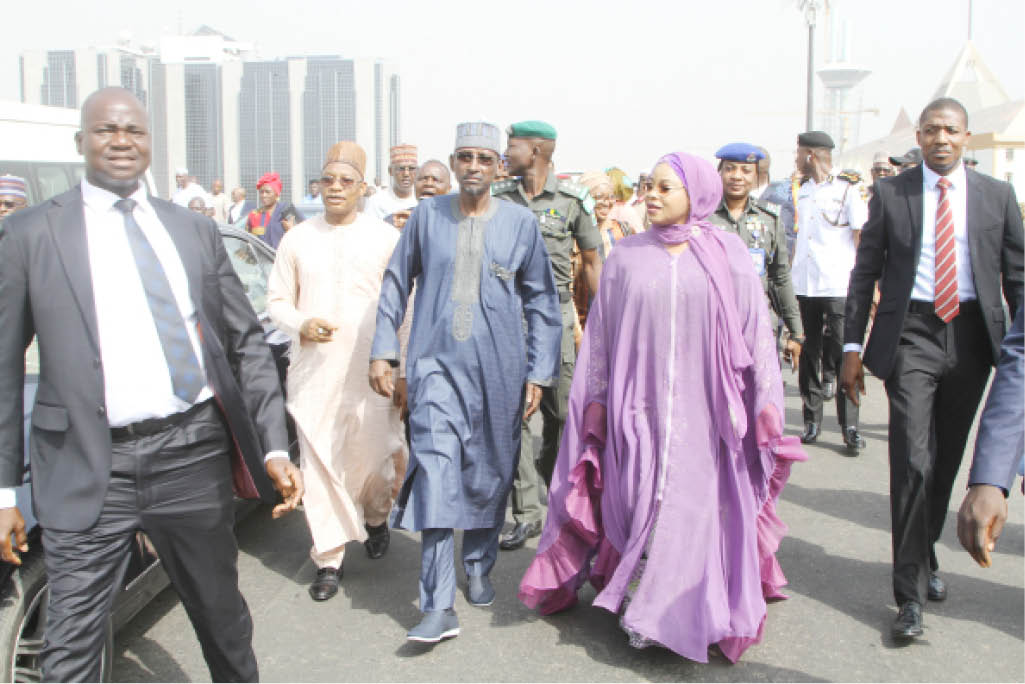Traffic eases off at Central Area as FCT minister commissions southern parkway
The Minister of the Federal Capital Territory (FCT), Malam Muhammad Musa Bello, on Monday, commissioned the one-way directional road traffic on the Southern Parkway in the Federal Capital City, Abuja. Conducting journalists round major points of the road, Malam Bello said, “This is one particular project on which we have spent enormous amount of time […]

FCT Minister, Malam Muhammad Musa Bello (middle), FCT Minister of State, Dr. Ramatu Tijjani Aliyu (right) and FCDA Executive Secretary, Engr. Umar Gambo Jibrin, flanked by security aides proceed to commission the one-way directional traffic system along the Southern Parkway in Abuja yesterday.
The Minister of the Federal Capital Territory (FCT), Malam Muhammad Musa Bello, on Monday, commissioned the one-way directional road traffic on the Southern Parkway in the Federal Capital City, Abuja.
Conducting journalists round major points of the road, Malam Bello said, “This is one particular project on which we have spent enormous amount of time and resources, because without completing this project, the northern and southern sectors of Abuja would not be connected. We’ve allowed two-way traffic movement for the last few months just to allow construction to continue. But we have reached a certain milestone where we will now start enforcing the one-way traffic system.”
Aso Chronicle observed yesterday that traffic has eased off around the Central Mosque and the Yar’adua Centre in the Central Business District. Both areas were usually congested during rush hours.
The single-direction traffic means; if you are going to the Federal Capital Development Authority (FCDA) from Mabushi and you hit the Sani Abacha Way, you do not need to exit at the Yar’adua Centre, you just keep going straight, past the frontage of the Central Mosque and proceed to the National Television Authority (NTA) where you will make a left turn by Infrastructure Concession Regulatory Commission (ICRC).
The minister explained that in the last few years, the FCT Administration (FCTA) had spent a lot of time and resources towards the completion of major arterial roads within the city, and expressed joy that most of them had reached a level of completion and could now be opened to the public.
Describing infrastructure in Abuja as second to none in Africa, the minister commended the effort of engineers of FCDA and SETRACO for a job well done, and urged the contractors to expedite effort to ensure 100 per cent completion of the project.
He said, “I’m so pleased to say that the partnership between the FCDA and SETRACO Nigeria Limited has been very beneficial to the city because I’m sure all of you know that the twin bridges were concluded about the same time, and you can see how these bridges have been able to link the northern and the southern parts of the city.”
The minister added that the bridge between the back of the Ecumenical Centre and Jaiz Bank, and that which is between the centre and the Central Bank of Nigeria (CBN), were crucial to the enforcement of the one-way traffic.
He said, “For us, this is a very important project. It also underscores the cardinal principle of President Muhammadu Buhari’s administration; which is infrastructure, because the way that Nigeria is growing and cities like Abuja are growing, if we do not complete major infrastructur, it will affect our economic development.”
While charging residents of the city to use the infrastructure provided by the FCTA properly, the minister thanked the senate for approving the portion of the Federal Government’s foreign loans that affected the FCT.
He said, “They approved two very important projects- the continuation of the phase two of the Abuja Light Rail project, as well as the widening of the Greater Abuja Water Works. These are all very fundamental legacy projects the benefits of which we will see in many years to come”.
The Southern Parkway, is the backbone of Abuja’s road network, traversing four key roads in the city’s main business districts of Garki and Central Business District with a web of access ways connecting CBN, FCTA, ICRC and NTA. The remaining stretch of the road which ends at the Nnamdi Azikiwe Expressway has also been completed.
